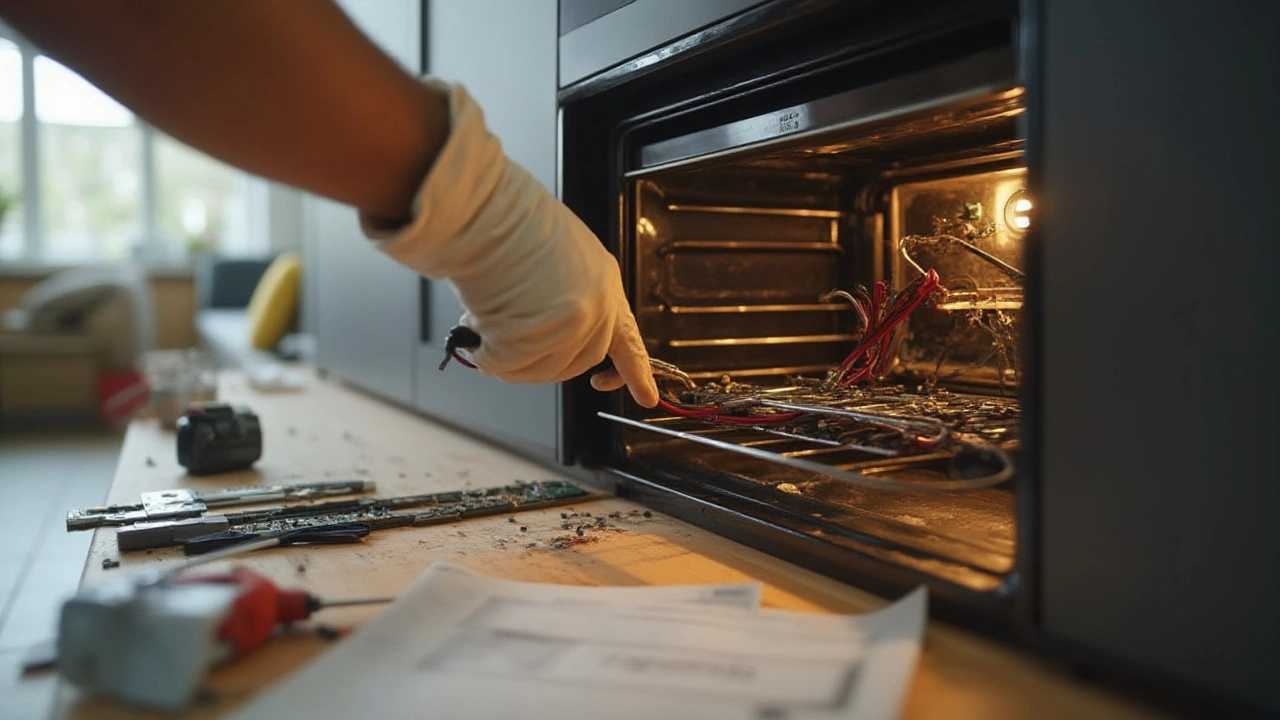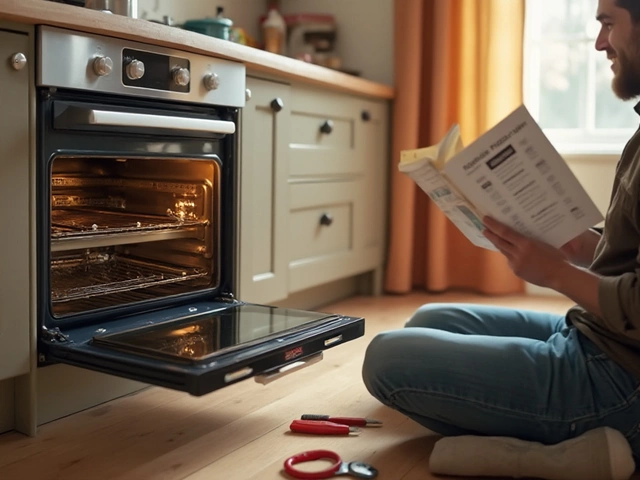Most people panic when the oven dies—right in the middle of baking a birthday cake or uni lasagna. If you’ve googled, “What do you call someone who fixes ovens?” you’re not alone. There’s no magic word everyone shouts, but it’s a bit more interesting than you might think. Some call them oven repair technicians, while others prefer appliance engineer, domestic appliance repairer, or simply, oven specialist. Whether your oven is gas or electric, modern or old-school, these folks know their way around hot, greasy machines where your Sunday roast depends on their expertise.
What’s the Actual Job Title?
There isn’t one single set-in-stone name, but in the UK, you’ll usually hear oven repair technician or domestic appliance engineer. If you walk into a repair shop in Bristol, they’ll probably nod knowingly if you say “oven fixer”, but if you want to look like you know your stuff, ask for an “oven repair engineer” or “appliance repair technician.” Some people lump these pros together as appliance repair specialists because most don’t just fix ovens—they handle hobs, cookers, ranges, and microwaves too. The industry term is important when you’re searching online or calling for help, since some technicians specialise in certain brands or types—electric, gas, dual fuel, or even commercial ovens in restaurants.
Just for fun, here’s a quick look at common terms:
- Oven repair technician (most searched)
- Appliance engineer
- Appliance repair specialist
- Domestic appliance repairer
- Oven specialist
In the US, “appliance repairman” gets tossed around, but in the UK, you’re looking for a domestic appliance engineer. It can seem like word soup, but each phrase points to the same profession: those who troubleshoot, diagnose, and repair ovens of all shapes and sizes. If you’re after someone super-specific, like for a luxury AGA oven, check for certified or brand-authorized engineers. Brands like Miele, Bosch, or Rangemaster sometimes insist on their own network for warranty reasons.
What Do Oven Repair Technicians Actually Do?
It’s not all about twisting screws and poking wires. Oven repair specialists handle a wild mix of mechanical, electrical, and sometimes even software-related problems nowadays. Modern ovens have circuit boards, digital displays, Bluetooth, Wi-Fi, and sometimes even self-diagnosing error messages. But a reliable technician isn’t thrown off by a blinking code or burnt smell—they unravel the real issue. Common repairs include replacing heating elements, fixing faulty thermostats, unclogging gas lines, resetting timers, or swapping out worn door seals.
The toolkit isn’t just spanners and screwdrivers anymore. Technicians carry multimeters for checking voltage, internet-enabled diagnostic tools, specific spares for brands (Bosch, Hotpoint, Smeg), and a strange confidence around live wires and gas pipes. Skill matters: a good repair tech can spot a worn capacitor just by glancing at the circuit board or listen to a “clunk” and know the fan motor’s on its last legs. Safety is key: For gas ovens, only engineers with a Gas Safe Register qualification can legally inspect or repair them in the UK. Many appliance issues look minor but are a real fire or gas risk, so the pro’s expertise keeps your home safe and your insurance intact.
Here’s a glimpse into the skill set and knowledge of a top oven repair tech:
- Diagnose faults (heating, door not closing, electrical shorts)
- Replace spare parts efficiently (heating elements, burners, fans)
- Perform electrical and gas safety checks
- Use brand-specific diagnostic software or error code lists
- Advise on whether to repair or replace old ovens
- Stay up to date with latest models and manufacturer changes
On average, a solid oven repair takes an hour or two. Some stubborn faults—like deep-set circuit failures or rare part replacements—might take longer or need a follow-up. In Bristol, a typical repair visit runs between £60 to £120, depending on parts and time. A study in 2024 by the UK Office for National Statistics put the median wage for appliance repair techs at £28,000 a year, with specialists for high-end brands sometimes earning double that. What might surprise you: 40% of oven breakdowns could be avoided with simple routine cleaning or by watching for early warning signs—like a weak flame or dodgy temperature control.

Tips for Finding and Working With a Good Oven Repair Tech
It’s easy to just click the first Google ad, but not all technicians are created equal. Reliability, skills, and clear pricing make a huge difference—not just in quality of fix, but whether you’ll need a follow-up two weeks later. Always check for qualifications: for any gas oven work, only use Gas Safe Registered engineers, which you can confirm at Gas Safe’s online database. Electric-only techs don’t need the registration, but should have City & Guilds or NVQ qualifications in appliance repair or electrical installation.
Here’s a checklist to get the right pro for the job:
- Ask for proof of qualifications and insurance
- Check for company reviews on Trustpilot, Google, or Checkatrade
- Ask if call-out fees are included in the estimate
- Get a clear, written quote before booking
- For newer ovens, ask if they have brand-specific training or are approved by the manufacturer
- If it’s a tricky fault, ask what their process is if they need to order unusual parts
Want to make their job easier—and possibly cheaper? Give as much info as possible before they arrive: model number, symptoms, when the fault happens (all the time, only when it’s hot, etc.), and what you’ve already tried (don’t hide the fact you “gave it a bash with a wooden spoon”). The more they know, the faster they can pinpoint the issue. Oven repair techs say the trickiest jobs are the ones where people keep trying random fixes first, which can turn a £15 fix into a £200 mess. Also, don’t be embarrassed about asking about guarantees. A reputable tech typically offers 3-12 months on parts and labour—make sure you get it in writing.
If you’re curious about cost, here’s a snapshot of the most common oven repairs and their average UK prices as of June 2025:
| Fault | Average Cost (£) |
|---|---|
| Heating element replacement | 85 |
| Thermostat replacement | 95 |
| Gas valve repair | 120 |
| Fan motor replacement | 110 |
| Ignition issues | 75 |
If you’re quoted a much higher price, ask for details. Sometimes it’s just a hard-to-find part, but get a breakdown before agreeing. Some techs offer rapid-response same-day repair for an extra £30–£50 if you can’t wait through the weekend without an oven. And if it’s older than 10–12 years, ask if replacement might actually be cheaper long-term—some repairs for vintage models cost more than a new mid-range oven.
Why It’s Smart to Use a Pro Instead of DIY
It’s tempting to try a YouTube quick fix, isn’t it? Sometimes swapping an easy-to-access part like a grill rack or oven bulb is a decent DIY job. But most oven repairs go beyond tighten-and-hope. Hidden issues like a cracked heat sensor, gas leaks, or dodgy wiring aren’t always obvious—and bodging them can void warranties or even trip your home insurance. There’s also the risk of electric shock or carbon monoxide leaks. In the UK, legally only a registered engineer can work on gas appliances for good reason. And unless you’ve got the proper tools and training, poking around inside a live oven is a recipe for bigger problems.
A trained oven repair specialist can often save you money in the long run by spotting early-warning problems that could wreck whole circuits or gas systems if ignored. They’ll test the oven for safety, check ventilation, and even give advice to keep it running longer. For newer ovens, tinkering can actually wipe out the manufacturer warranty—so check your paperwork before opening anything.
Most home insurers won’t cover damage caused by DIY repair attempts. And if you’re in rented accommodation, repairs to electric or gas ovens (that came with the flat) are usually up to the landlord, by law. That said, repeated issues—like one part burning out again and again—mean something deeper is wrong. Don’t just keep calling for the same fix; get a pro who does thorough diagnostics for the root cause.
If you want to avoid future breakdowns, ask your appliance engineer for preventative tips: things like regular door seal checks, proper oven cleaning, and not slamming the oven door (yeah, we all do it). Something as small as using a mild cleaner instead of harsh scrubbers can stop tiny wires and sensors from corroding or pulling loose.
And here’s an odd but true Bristol fact: oven repair callouts spike every year right before Christmas—meaning the best techs get booked solid. Plan for a checkup in early November if you want a stress-free festive season. Not glamorous, but it beats serving everyone takeaway chips on the big day.




